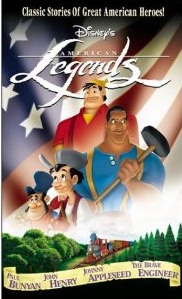Plot
In 1806, young Pittsburgh farmer Johnny tends his apple orchard and happily sings a tune "The Lord Is Good to Me", thankful for his comfortable life. However, he wistfully watches as pioneers depart out west to the American frontier and wishes that he could follow, but doesn’t know how to survive in the unknown wild. A personal angel appears to Johnny (looking more like a wise pioneer than a traditional angelic figure) and inspires him to abandon his farm, go west, and plant apple seeds everywhere he goes so that settlers will always have something to eat during their travels. A reluctant Johnny tells the angel he'd like to go, but doesn't have the gear or equipment. The angel tells Johnny that he has all that he needs to go out West: a bag of apple seeds for planting, the Bible to read, and a tin pot he can use for a hat as well as cook with. Convinced, and with purpose, Johnny dutifully sets out all on his own into the untamed wilderness.
Shortly into his travels west, while wandering the dark and treacherous land alone, Johnny finds a bare plot of land to start an apple orchard. The wild animals of the woods are wary of him, afraid to approach thinking he means to hunt them like other pioneers. Yet while planting his seeds, Johnny kindly befriends a skunk to the surprise and relief of the other animals, and thereafter, all animals instinctively trust him.
After many years of planting apple trees all around the frontier, Johnny's earned the moniker Johnny Appleseed. Many of the now grown trees become a boon to the other pioneers just as the angel predicted. The harvested apples help the budding communities thrive and expand. Johnny, now older and wearing worn clothing along with a beard, but still sporting his iconic tin pot hat, pauses his travels to watch a pioneer festival. The local folks sing, dance, and play games with the apples, and finally have a huge feast with many dishes made using apples. Johnny is happy to see his trees bringing joy and good fortune, but quickly moves along followed by his animal companions.
In the end, after walking hundreds of miles and planting thousands of apple trees all along the way, an elderly Johnny finally rests for the last time under a tree. His angel appears again before him, and tells Johnny that it is time to go. Johnny's spirit gets up instead of his body, scared at first upon realizing he has passed away. Fear quickly turns into frustration as Johnny's spirit is reluctant to go to his final resting place, believing that his work is not done yet on Earth. However, the angel lovingly tells him that, where they are headed, they are low on apple trees. Hearing this, Johnny excitedly picks up his seed bag and happily agrees to go with him, singing together on the way.
The narrator finishes by saying that he always thinks of Johnny Appleseed whenever he looks up because the clouds in the sky are not really clouds at all: "They're apple blossoms, if you please, from John's heavenly orchard of apple trees".
This page is based on this
Wikipedia article Text is available under the
CC BY-SA 4.0 license; additional terms may apply.
Images, videos and audio are available under their respective licenses.
